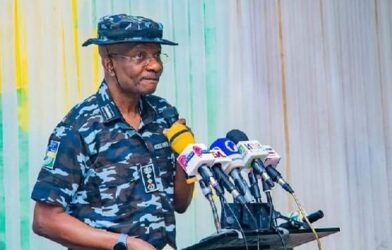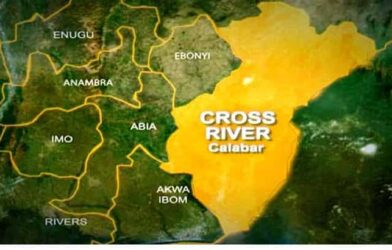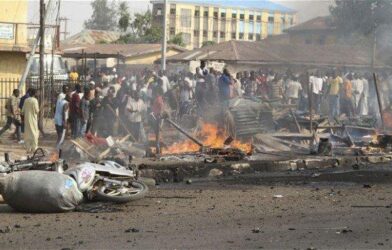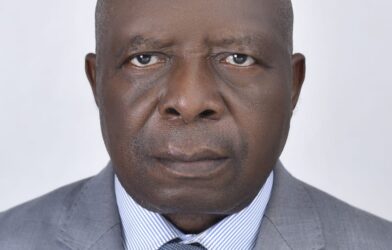16
A presidential aspirant of one of the two mainstream political parties in the United States of America has just lost the nomination to his opponent in a keenly contested presidential primary. Thinking that the combination of both men would make a formidable team in the looming presidential election, the loser was asked whether, if contacted, he would accept to be running mate to the winner of the party flag. His response was terse: “I hate all vices, including the vice presidency”!
In most countries, especially in a democracy, the vice president is seen as the Number Two man; although I think this should not be so, especially where the three arms of government – the Executive, Legislature and Judiciary – are deemed equal and co-terminus according to the theory of separation of powers as propounded by Baron de Montesquieu. One arm should not be Number One and Number Two at the same time. If the Executive claims the Number One slot, then, the Legislature and Judiciary should share the Number Two and Number Three slots as the head of the other two arms of government. The vice president heads no arm of government. He becomes relevant only when the president is not available. But this is an argument for another day!
Whoever it was that likened the vice president or deputy governor to a vehicle’s spare tyre is closer to the point. Spare tyres are irrelevant when the actual tyres are in active service. What is a spare? A dictionary definition says it is “an extra tyre carried in a motor vehicle for use in case of a puncture” In the event of no puncture, then, the spare tyre is of no relevance but is a burden that occupies space that could otherwise have been converted to more beneficial use. Little wonder, then, that many motor vehicles these days have devised the means of tucking the spare tyre away in compartments that would not use up space needed for more useful purposes.
Are “spare tyres” similarly of little or no use in a political setting? The answer is yes and no. In the United States, there is the saying that the vice president is to be seen and not heard. In other words, the Number Two must not hug, share or struggle for the limelight with the boss. When the mother elephant trumpets, the baby must keep quiet! Any errant baby elephant that trumpets when the mother trumpets will get a knock on the head to silence it! Like John the Baptist, the forerunner, said in the scriptures that he must decrease for Jesus Christ to increase, the vice president or deputy governor is to promote his or her boss rather than attempt, like Lucifer did with God, to set up his or her own throne and contest power with or undermine the boss.
The 1999 Constitution of the Federal Republic of Nigeria (as amended) invests the president and governors with immense powers, such that their vice is left virtually at their mercy. They can empower them; they can also emasculate them. Even where the Constitution vests the vice president with the headship of the National Economic Council, he still can only effectively function in this office at the pleasure of the president.
This, however, is not to say that the position of vice president or deputy governor is totally irrelevant. For the purpose of contesting elections, no one can be deemed duly elected as president or governor without having a duly elected vice or deputy. Where the election of a vice or deputy is voided, the election of the president or governor stands similarly voided. I think this is what the African-American politician and civil rights activist, Rev. Jesse Jackson, means when he said a bird needs two wings to fly.
Our history is replete with strong deputies who even took the shine off the boss. Chief Obafemi Awolowo was a strong deputy to Gen. Yakubu Gowon. When Gowon, in 1974, declared 1976, the date he had earlier set for the return to civilian rule, as unrealistic and Awo left his cabinet, he was toppled on July 29, 1975 while attending an OAU meeting in Addis Ababa, Ethiopia. Gen. Murtala Muhammed was a strong leader; his deputy, Gen. Olusegun Obasanjo, was not seen, not to talk of being heard. But when Obasanjo himself became the Head of State as a result of the assassination of Murtala on February 13, 1976, his deputy, Gen. Musa Yar’adua, was not only a very strong deputy, he was the de facto ruler while Obasanjo was a mere figurehead Head of State.
The country’s first civilian president, Alhaji Shehu Shagari and his vice, Dr. Alex Ekwueme, were both captives of their party, the National Party of NIgeria (NPN). The party chairman, Meridith Adisa Akinloye, and Umaru Dikko, of the rice and cement armada fame, were, perhaps, even more powerful than Shagari and Ekwueme.
Buhari as military dictator (1983 – 1985) was not as powerful as his deputy, Tunde Idiagbon. Buhari is said characteristically to enjoy the plums of office while someone else does all the job for him. So, Idiagbon was famously regarded as Buhari’s brain box in Buhari’s first coming as the country’s leader.
Ibrahim Babangida was his own man. He marginalized his deputy, Commodore Ebitu Ukiwu, who was forced to resign and was replaced by pliant and fawning Augustus Aikhomu. Sani Abacha, like Babangida, was his own man. Efforts by his deputy, Gen. Oladipo Diya, to wield some influence led to his being entangled in allegations of a coup plot. Diya barely escaped with his life.
Gen Abdulsalami Abubakar and his deputy, Mike Akhigbe, were birds of a feather – drab! The only eventful events of their tenure were that MKO Abiola, winner of the June 12, 1993 presidential elections judged free and fair by all, died in their custody; they released some detained persons and also handed over power to a civilian government on May 29, 1999.
In his second coming as Nigeria’s leader, Obasanjo, in his first term of office, literally ceded effective power to his deputy, Alhaji Atiku Abubakar, who leveraged it to feather his nest. Atiku nearly pulled the rug off Obasanjo’s feet but the wily old fox fought back and had Atiku’s back to the wall during his second term. Nevertheless, Atiku was a strong deputy.
Umaru Yar’Adua was a strong-willed leader but ill-health got the better part of him. Both as vice president and as president, Goodluck Jonathan was a weak leader. Jonathan and his vice, Namandi Sambo, were birds of a feather – colourless!
In Buhari’s second coming as NIgeria’s leader, he was an absentee president who abdicated power to a cabal of family members and friends to run the country aground while serving ethnic, religious and regional interests. Buhari’s vice, Prof. Yemi Osinbajo, was a passenger in the corridors of power. At best, he only improved on his curriculum vitae!
It is too early to say what kind of leader President Bola Ahmed Tinubu will make. As the governor of Lagos State, he was a strong governor who saw off two deputy governors before finishing his second term with the third. Will he make a strong president? For now, the answer blows in the wind. The confidence he found to announce that fuel subsidy is gone in his inaugural address to the nation must now be brought to bear in vital sectors of the country’s national life: rampaging insecurity, runaway inflation and virtual economic collapse, the fight against corruption, and the need to call his predecessor to account for his atrocious tenure.
Tinubu’s vice, Kashim Shettima, was a strong governor in Borno but is yet to carve a niche for himself as the country’s Number Two. What did he bring into this government, if I may ask? What is his forte? Is it security? Is it the economy? Is it bridge-building and fire-fighting? I have not seen much of Shettima’s contributions to the Tinubu presidency.
Tinubu is engulfed on many fronts. He appears to me as the only one fighting the fires. Exasperated, I think, his wife, Oluremi, joined the fray the other day in Bauchi, gallantly vowing to die fighting on the side of her husband. Where are the key members of the Tinubu administration and in which area are they lifting up Tinubu’s hands, like biblical Aaron and Hur did unto Moses?
Although Tinubu has passed a vote of confidence in his Chief of Staff, all we hear from some circles are stories of scandals, more scandals and still more scandals! The office of the Secretary to the Government of the Federation is powerful; a Northern Christian occupies it. Has that resulted in his ability to wall in his constituency around the president?
The greatest challenge of the country today is insecurity – which is gulping money that otherwise should have been put to productive ventures, which is destroying critical infrastructure, which is driving farmers from the farm and students/pupils from school, which is creating millions of internally-displaced persons, which daily leads to the killing and maiming of the innocent, which breeds kidnapping for ransom, etc.
Yet, the National Security Adviser is from the same North. The MInister of Defence is from the same North. The Chief of Defence Staff is from the same North. The Chief of Air Staff is from the same North. We can go on and on! What have all these people brought to the table?
Opinion is divided as to the actual role of the vice president in the Boko Haram debacle but what cannot be denied is that he has a wealth of experience when the topic of discussion is insurgency. How has he brought that experience to bear since May 29, 2023?
Is there a grand design to continually bleed this country for some people to daily smile to the bank? Is there a plot to make the country ungovernable for a southern President? A scantily-concealed scorched-earth policy to unhing this President may be afoot. Who is for and who is against needs to be unraveled.
turnpot@gmail.com 0807 552 5533
Former Editor of PUNCH newspapers, Chairman of its Editorial Board and Deputy Editor-in-chief, BOLAWOLE was also the Managing Director/ Editor-in-chief of THE WESTERNER newsmagazine. He writes the ON THE LORD’S DAY column in the Sunday Tribune and TREASURES column in New Telegraph newspaper on Wednesdays. He is also a public affairs analyst on radio and television.












Comments are closed